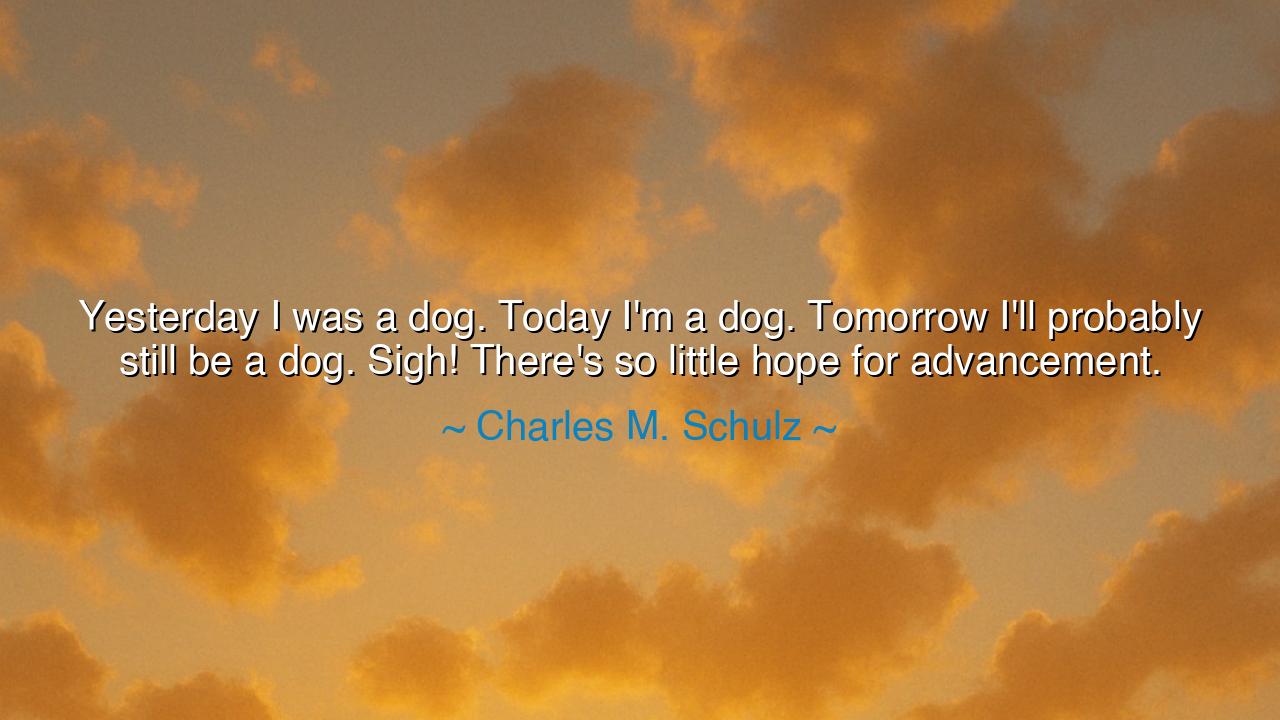
Yesterday I was a dog. Today I'm a dog. Tomorrow I'll probably
Yesterday I was a dog. Today I'm a dog. Tomorrow I'll probably still be a dog. Sigh! There's so little hope for advancement.






Charles M. Schulz once wrote, through the voice of his beloved creation Snoopy: “Yesterday I was a dog. Today I’m a dog. Tomorrow I’ll probably still be a dog. Sigh! There’s so little hope for advancement.” At first, it seems like a simple, humorous observation from a cartoon dog lying atop his doghouse — but as with all great truths cloaked in jest, this line carries a weight that transcends its form. In these few words, Schulz captures the human struggle for growth and change, the longing to rise above limitation, and the gentle resignation that comes when we realize some parts of our nature cannot be altered. It is both a sigh of frustration and a smile of acceptance — a lesson wrapped in laughter, delivered with the quiet wisdom of the ancients.
The origin of this quote lies in Schulz’s Peanuts comic strip, where he often used humor to explore the deep philosophical dilemmas of everyday life. Through Snoopy, the whimsical yet thoughtful beagle, Schulz spoke to the human soul — its restlessness, its vanity, its yearning for meaning. In this line, Snoopy reflects on the unchanging reality of his condition: no matter what he does, no matter how much he dreams, he remains a dog. Beneath the surface, Schulz speaks for every person who has looked at their life and sighed, feeling trapped by circumstance, by identity, or by the limits of their own nature. It is a moment of existential comedy — the laughter that rises not from mockery, but from recognition.
But there is another layer still deeper. The ancients would have seen in Snoopy’s lament the timeless truth of human limitation. The Greek philosophers often spoke of knowing one’s place in the order of things. Socrates declared that wisdom begins with acknowledging what one does not and cannot know. Schulz’s dog, in his humorous despair, touches the same insight — that there are boundaries in life we cannot cross, no matter how fiercely we wish to. A bird may envy the eagle, but it cannot soar beyond its nature; a man may dream of immortality, but he must still bow before death. Snoopy’s sigh, then, is the sigh of all who have come to recognize the bittersweet truth of existence: that to be mortal is to live within limits, and that peace comes not from escaping them, but from understanding them.
Yet, Schulz does not leave us in despair. There is, within the humor, a gentle call to contentment. If we cannot change our essential nature, then perhaps the task is not to escape it, but to live joyfully within it. Snoopy may remain a dog — but what a life he makes of it! He dreams of being a World War I flying ace, a novelist, a philosopher. He imagines worlds beyond his doghouse and finds meaning in them all. In that way, Schulz teaches that while our nature may not change, our imagination and attitude can transform everything. The dog who cannot become a man can still become a dreamer, a poet, a friend. The limitation of form does not imprison the spirit; it gives it something to transcend in its own way.
We see this same truth reflected in history. Consider Epictetus, the Stoic philosopher who was born a slave in ancient Rome. His condition, like Snoopy’s, seemed unchangeable — a man bound by status, without hope for worldly “advancement.” Yet within that confinement, Epictetus discovered freedom. “You may fetter my body,” he said, “but my mind remains my own.” Like Snoopy atop his doghouse, he found within himself a universe of thought, humor, and peace. The Stoic sage and the comic dog are kindred spirits: both teach that true growth lies not in changing what you are, but in transforming how you live within what you are.
And so, Snoopy’s sigh is not only a lament — it is a mirror. It reflects back at us our own quiet disappointments, the times when we feel unmoved despite effort, unadvanced despite dreaming. But through Schulz’s gentle humor, it also offers the cure: acceptance paired with imagination. Life will always have its ceilings, its immutable facts. But within those bounds lies infinite room for wonder. The key is not to curse what cannot be changed, but to celebrate what can — our outlook, our kindness, our capacity for joy.
Let this then be the lesson: Do not despair over what you cannot become; rejoice in what you already are. Advancement of the soul does not always mean rising higher; sometimes it means seeing deeper. Even if you wake tomorrow the same as today, there is dignity in being — and joy in dreaming. Like Snoopy, do not let your limits confine your spirit. Imagine, play, laugh, and live with heart. For as Schulz knew — and as the wise of every age have taught — the secret of life is not to escape what you are, but to love it fully, and to fill it with meaning until even the smallest life becomes vast.
In the end, the little dog’s sigh becomes our own — a soft exhale of acceptance and peace. Yesterday I was a dog. Today I am a dog. Tomorrow I will still be a dog. Yet within that sameness, the stars still shine, the wind still moves, and the heart still dreams. And that, perhaps, is advancement enough.






AAdministratorAdministrator
Welcome, honored guests. Please leave a comment, we will respond soon